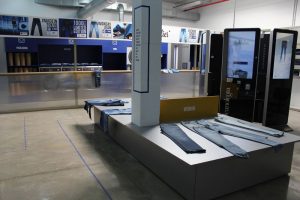IEPER, Belgium — November 4, 2021 — Picanol has introduced its latest generation of airjet and rapier weaving machines, which have been called the “Connect” generation. These new generation weaving machines focus on connectivity and an increased level of data availability. With this new generation, Picanol is launching several new functionalities such as a digitalized Gripper stroke setting, Gripper tape monitoring, Climate control, Shed angle measurement, and fully integrated Power monitoring.
“Following the successful launch of our digital platform PicConnect earlier this month, we have now released a new generation of weaving machines, which are known as the Connect generation. Our Connect generation weaving machines can provide the correct data and are loaded with new and never-before-seen functionalities. This is clear proof that for Picanol “Driven by Data” is not just a slogan but a commitment. Not only have these innovations allowed us to make big improvements when it comes to our four design principles – Smart Performance, Sustainability Inside, Intuitive Control, and, of course, Driven by Data – but when combined with our new digital platform they will allow you to amplify your own intuition,” commented Johan Verstraete, vice president, Weaving Machines.
From now on, the range of Picanol weaving machines will have the “Connect” suffix. For the airjet weaving machines, this means: OmniPlus-i Connect and TerryPlus-i Connect, while for the rapier weaving machines, this means: OptiMax-i Connect and TerryMax-i Connect. These new machines are built around Picanol’s four main design principles:
Smart Performance
On the OptiMax-i Connect, Picanol has introduced a lubrication monitoring sensor in combination with a temperature sensor. The combined data they provide allow the user to make sure the gripper tapes are in optimal condition for maximum performance. As an option, a gripper stroke measurement sensor is also available. This not only dramatically simplifies the setting of the gripper stroke, but also enables the user to realize higher machine speeds when weaving reduced widths — a pure extra output combined with more user-friendliness: a double win!
Sustainability Inside
Even though it was 25 years ago that the Sumo Drive concept was launched, it remains the most powerful, versatile and energy friendly machine drive available. And it has been even further optimized. It features an optimized sheet metal package for lower energy consumption, optimized oil cooling circuit for a better performance and a built-in temperature monitoring. Moreover, the Connect machines can be equipped with a Power monitoring module, which allows the user to keep track of the power consumption of each machine over time. Every Connect machine also has a built-in ambient temperature and humidity sensor, which will help to optimize the climate control in the weaving shed at the lowest cost. And as raw material is the biggest cost factor, each machine can also be equipped with raw material use monitoring.
Driven by Data
As the machine has more sensors than ever before, it also generates more data. To enable a fast reaction to all these sensor data, the BlueBox control unit has been further optimized: better heat management guarantees short reaction cycles combined with the long lifetime of components. To have a good view of all of the data generated, a special sensor dashboard screen is available in the BlueTouch display: with a simple touch of the screen, the current and historical power consumption, temperature, humidity, material consumption, and — on the OmniPlus-i Connect — also the air consumption, can be monitored. The BlueTouch display is now also equipped with an Action center, an electronic logbook where all actions such as maintenance interventions can be logged or scheduled beforehand. The machine manual is now available on the BlueTouch display, and with the context- based help function the help pages related to the operation the user wants to perform appear with one touch of his/her fingertip. The built-in web browser even allows the user even to consult, for example, tutorial videos on the web to guide them through a setting procedure.
Intuitive Control
The Connect generation was designed to focus on what really matters: weave the highest possible grade A fabrics at minimal costs. A large set of tools have been installed to facilitate this goal. One of the most remarkable ones is the Harness frame stroke measurement — until recently, it was only available on the revolutionary SmartShed, but it is now also available on the cambox and dobby machines. Combined with the shed visualization and simulation, it offers a quantum leap in terms of optimizing the user’s shed settings without losing any time or taking any risks. The colors of the programmable Smart signal lights with stop timing functionality are now repeated around the push buttons, allowing even better visibility and the prioritization of interventions by the weaver. A full- fledged Access control system not only limits the access to certain pages and settings depending on the user, but also allows a tailored dashboard to be established for each user profile.
It is also clear that in combination with the new digital platform PicConnect, the Connect machines will help you to jump immediately to the next level of weaving that we call “the era of intuitive weaving”.
Posted November 4, 2021
Source: Picanol NV










